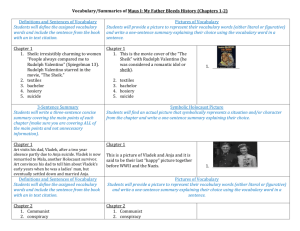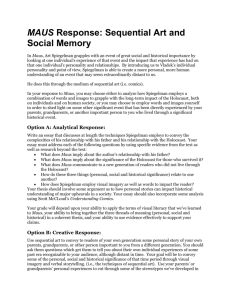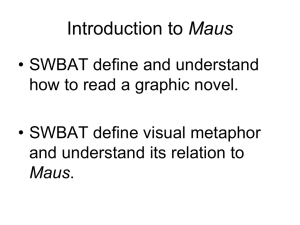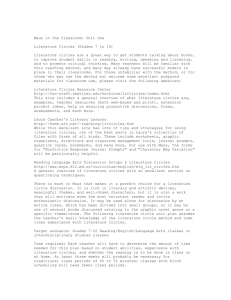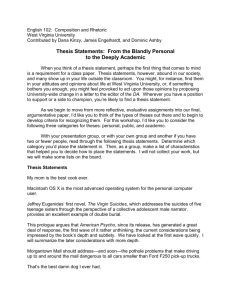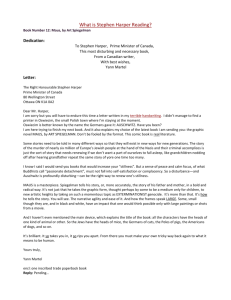Art Spieglman's Maus dramatizes the ways in which the traumatic
advertisement
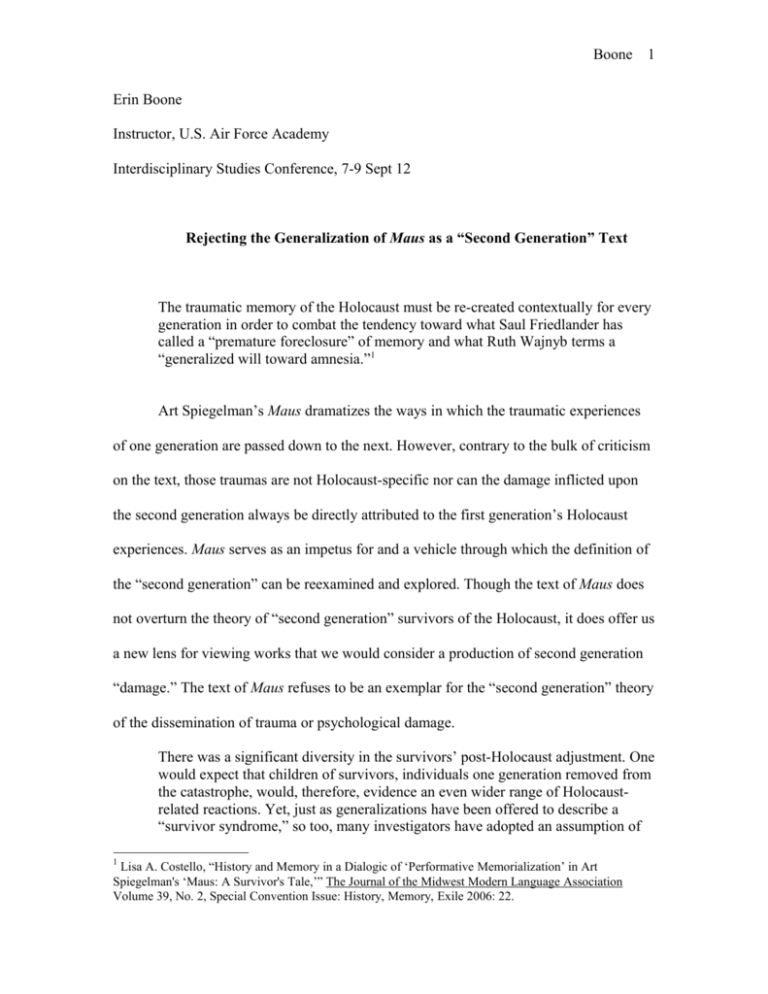
Boone 1 Erin Boone Instructor, U.S. Air Force Academy Interdisciplinary Studies Conference, 7-9 Sept 12 Rejecting the Generalization of Maus as a “Second Generation” Text The traumatic memory of the Holocaust must be re-created contextually for every generation in order to combat the tendency toward what Saul Friedlander has called a “premature foreclosure” of memory and what Ruth Wajnyb terms a “generalized will toward amnesia.”1 Art Spiegelman’s Maus dramatizes the ways in which the traumatic experiences of one generation are passed down to the next. However, contrary to the bulk of criticism on the text, those traumas are not Holocaust-specific nor can the damage inflicted upon the second generation always be directly attributed to the first generation’s Holocaust experiences. Maus serves as an impetus for and a vehicle through which the definition of the “second generation” can be reexamined and explored. Though the text of Maus does not overturn the theory of “second generation” survivors of the Holocaust, it does offer us a new lens for viewing works that we would consider a production of second generation “damage.” The text of Maus refuses to be an exemplar for the “second generation” theory of the dissemination of trauma or psychological damage. There was a significant diversity in the survivors’ post-Holocaust adjustment. One would expect that children of survivors, individuals one generation removed from the catastrophe, would, therefore, evidence an even wider range of Holocaustrelated reactions. Yet, just as generalizations have been offered to describe a “survivor syndrome,” so too, many investigators have adopted an assumption of 1 Lisa A. Costello, “History and Memory in a Dialogic of ‘Performative Memorialization’ in Art Spiegelman's ‘Maus: A Survivor's Tale,’” The Journal of the Midwest Modern Language Association Volume 39, No. 2, Special Convention Issue: History, Memory, Exile 2006: 22. Boone 2 the inevitability of transmission of pathology from survivors to their children. It is asserted that because Holocaust experiences negatively affected the survivor’s capacity for human relations, he or she has been unable to be an effective parent and that this disability has had damaging psychological ramifications for children raised by these adults.2 The “second generation” of Holocaust survivors, as they have been termed, is the “new generation of children born to survivor families.”3 Holocaust survivors, the first generation, have been a topic of psychoanalytic study almost since the concentration camp gates closed. In the mid-1960’s, the first scholarly work emerged regarding the experiences of therapists attempting to treat this new “second generation.” Though the initial research and the studies completed since do not show that not all survivor families produce psychologically disturbed or conflicted children, there appears to be a disproportionate number of second generation children who require psychological treatment: Sigal and Rakoff (1971) compared adolescent children of survivor-families with a control group of teenagers and found more evidence of disturbance and impaired adaptive behavior in the survivor group, as well as greater feelings of alienation and greater evidence of dependence on parents.4 Studies have been produced that “prove” a variety of conflicting information about the “truth” of second generation survivors: survivors encourage aggressive behavior in their children or survivors have a lower than normal tolerance for aggression in their children; parents are emotionally uninvolved and distant or they are overly involved and look to their children to provide meaning in their empty lives5, etc. Throughout the research the common thread of knowledge produced suggests that the maladaptive behaviors of 2 Aaron Hass, In the Shadow of the Holocaust: The Second Generation (Ithaca: Cornell University Press, 1990) 25. 3 Martin S. Bergman and Milton E. Jucovy, Generations of the Holocaust (New York: Basic Books, Inc, 1982) 18. 4 Martin S. Bergman and Milton E. Jucovy, Generations of the Holocaust, 19. 5 Martin S. Bergman and Milton E. Jucovy, Generations of the Holocaust, 19-23. Boone 3 Holocaust survivors, as a result of the traumatic events they endured during the war, often have an effect, generally a negative one, upon their children. As referenced in the quote that preceded this paragraph, based on the wide-variety of research on the reactions and psychological profiles of Holocaust survivors it would stand to reason that the reactions and profiles of the children of survivors would be even more diverse and varied. Unfortunately, even more so in the research that emerges in the 1970’s and beyond, there is a tendency in the academic and psychiatric communities to generalize the experiences of children of Holocaust survivors and attribute their neuroses and problems unilaterally to their experience of being a “second generation” of Holocaust survivors. The body of critical work surrounding Maus certainly supports this generalization and sees the character of Artie, and at times the author of Art Spiegelman, as a member of the second generation community, unmistakably traumatized by his parents Holocaust experiences. In particular, the relationship between Artie and his father, Vladek, does not appear to be able to be analyzed outside of the context of Vladek’s Holocaust experiences: The difficulties in communication that Artie and his father encounter in the relation and translation of Vladek's story are a reflection, therefore, not only of their complex interpersonal relationship on a subject/object level but of an entrance into uncharted genres and dialogues with collective history and collective audiences, where the regulations for communication between speaker and audience are not yet clear.6 Vladek and Artie undeniably have trouble communicating with one another, but their problematic relationship cannot be seen by most critics outside of the collective history of the Holocaust, which is highly limiting. In fact, the body of criticism suggests that Artie 6 Lisa A. Costello, “History and Memory in a Dialogic of ‘Performative Memorialization’ in Art Spiegelman's ‘Maus: A Survivor's Tale,’ 33. Boone 4 cannot even create an identity for himself outside of the role of a child of a Holocaust survivor, which is a poor characterization that is unsupported by the text. The scene in Maus when Vladek reveals to Artie that he has burned Anja’s diaries sparks much of the criticism that characterizes Spiegelman’s work as a hallmark of a second generation survivor story. In regard to Vladek’s destruction of Anja’s diaries the postmodern critic Eric Bertlatsky states: Vladek has contributed (in Artie’s eyes) to the forces of “forgetting” against the forces of memory. Artie’s hope for a coherent remembered past from which to construct his own identity is denied by his father’s destruction of the diary.7 Echoing the fear voiced by Saul Friedlander and Ruth Wajnyb in the quote that opened this essay, there is a generalization placed upon the community of Holocaust survivors that posits that the community as a whole is constantly worried about the world forgetting the horror of the Holocaust. Whether that is an accurate characterization of the community or not is not the subject of this paper, so I will not examine the generalization made about the survivor community. Rather, it is apparent in Berlatsky’s quotation above that he views Artie as a member of the community of Holocaust survivors that fear that the Holocaust will be forgotten. Simultaneously, Berlatsky states that Artie is attempting to discover his identity through his mothers diaries, but this assertion is almost an afterthought to his main point of Artie’s anger at his father’s participation in the “forgetting.” In the text, Anja’s diaries are only mentioned once before their destruction is confirmed. At no point in the text is there any definite reference to the diaries content beyond Artie’s speculations that the diaries will contain Anja’s experiences and 7 Eric Berlatsky, “Memory as Forgetting: The Problem of the Postmodern in Kundera's The Book of Laughter and Forgetting and Spiegelman's Maus,” Cultural Critique, Volume 55, Fall 2003: 105. Boone 5 perspective on what transpired while she and Vladek were separated in the camps. The one comment of what was inside the journals comes through Vladek’s recollection of flipping through them and recalling, “Only I know that she said, ‘I wish my son when he grows up, he will be interested by this.’”8 Though it is clear that Artie desires the notebooks to show his mother’s perspective and “give the book some balance,”9 there is no mention that the diaries only contain her Holocaust experiences. In fact, Artie’s first mention of the diary is, “My father mentioned that Anja used to keep a diary, and I vaguely remember seeing them on the shelves in the den.”10 From this broad statement, his mother could have easily kept a daily diary for years and it is her voice about her life in general, or perhaps even about himself as a child, that Artie wishes to unearth. Artie’s use of his mother’s first name is harshly juxtaposed with his reference to Vladek as “my father.” Mala, to whom Artie is speaking, married Vladek long after Artie was out of the home and the two women had been friends during Anja’s lifetime, so if Artie had used the term, “my mother,” there was no chance of Artie offending or angering Mala by referencing Anja as his mother. Rather, it appears that Artie feels distant from the figure of his mother, which is supported by his depiction of her in his imbedded cartoon “Prisoner on the Hell Planet” and the fact that she is largely absent in the novel though she did not die until Artie was an adult. As Berlatsky asserts, Artie does desire to construct an identity through his mother’s diaries, but an identity for himself as a child of a woman he does not know, not specifically through her experiences in the Holocaust, which he clearly wants to posses for the academic purpose of balancing his book. 8 Art Spiegelman, Maus: A Survivor’s Tail – My Father Bleeds History (New York: Random House, 1973) 159. 9 Art Spiegelman, Maus: A Survivor’s Tail – My Father Bleeds History, 132. 10 Art Spiegelman, Maus: A Survivor’s Tail – My Father Bleeds History, 93 Boone 6 Another scene that critics identify as key to an understanding of Spiegelman and the character of Artie as emblematic figures of the second generation is the roller skating scene that opens Maus. The close-up frame and the foregrounded figure of Vladek emphasize how much Vladek's past bleeds into Artie's present, but Artie never fades completely into the background. The tattoo looms over Artie's head, showing that Auschwitz remains central to their strained relationship, typical for many second-generation survivors.11 Costello’s words emphasize how Artie’s life is not only overshadowed by Vladek’s experiences but that his present is constantly defined by his father’s past experiences. The line, “The tattoo looms over Artie's head,” is moving and powerful but entirely unsupported by the text. You are unable to see Vladek’s tattoo, though it is clear later in the text that Vladek does have one, in the scene at all. In fact, in every frame, Vladek and Artie are depicted proportionally to one another with the exception of a headshot of Vladek’s surprised reaction to his son and his statement of “Friends? Your friends?...”12 All of the references to the Holocaust in this scene emerge from Vladek; Vladek’s experiences in the Holocaust certainly colors Vladek’s view of the world, but there is no proof in the text that it colors Artie’s or even that it looms over this childhood memory, in the way that the memory of his father’s tattoo being exposed would. Similarly, Victoria Elmwood discusses the same scene and states that not only is Artie caused psychological difficulties as a result of the stress from his parents Holocaust experiences, but in this scene Artie is the paradigm of the experience of a second generation survivor: 11 Lisa A. Costello, “History and Memory in a Dialogic of ‘Performative Memorialization’ in Art Spiegelman's ‘Maus: A Survivor's Tale,’ 31. 12 Art Spiegelman, Maus: A Survivor’s Tail – My Father Bleeds History, 6 Boone 7 Spiegelman suggestively begins his two-volume narrative with a poignant illustration of secondary witnessing that suggests the kinds of psychological difficulties that result for the second generation from the stresses of realities that they have only experienced indirectly. This initial episode in Rego Park stands out as a paradigmatic second-generation episode in which the child’s woes are discounted by the magnitude of his parents’ traumas. Unable or unsure of how to comfort his son, Vladek disregards Artie’s experience as trivial, contrasting a children’s spat rather dramatically to his own survival of the Holocaust, suggesting the extent to which Artie grows up with the Holocaust as the main benchmark against which to measure his own life.13 As the paradigm of the second generation, Artie is not allowed agency in his own narrative because he has the weight of representation of an entire generation and an even larger community upon his work. It is unclear even if Vladek is in fact, “unable or unsure of how to comfort his son” because there is no suggestion that Vladek feels any inner conflict in the scene. Vladek certainly dismisses Artie’s tears over his rejection by his friends and compares it, perhaps even trivializes it, in comparison to his own experiences, but there is no proof that the image of Vladek that we see or the coldness we see in his interpersonal relationships were created as a result of Vladek’s experiences during the war. The clearest scene in the text when we are shown Vladek’s peculiar personality as a miserly racist and given a reflection upon his personality from the characters within the text is in Maus I when Mala expresses her frustration to Artie over Vladek’s penny pinching ways: Mala: I swear, sometimes I think he married me because I am the same size as Anja! Artie: He’s always been – pragmatic – Mala: PRAGMATIC? CHEAP! … Artie: I used to think the war made him that way. 13 Victoria A. Elmwood, “"Happy, Happy Ever After": The Transformation of Trauma Between the Generations in Art Spiegelman's Maus: A Survivor's Tale,” Biography, Volume 27, Number 4, Fall 2004: 696. Boone 8 Mala: Fah! I went through the camps. All our friends went through the camps. Nobody is like him!14 Clearly, despite Mala’s experiences during the Holocaust, and those of their common friends, no one is as extreme in their miserly ways as Vladek is. Bertlatsky’s discussion of this scene shows a clear interaction with the reality of the text; “…the text refuses to allow the Holocaust as an excuse for domineering and occasionally hate-filled behavior.”15 Berlatsky’s comments continue with a discussion of Vladek’s racist reaction to a hitch-hiker and in these comments we can open a discussion of the origin of Vladek’s personality traits: Vladek’s racism is especially telling in showing the dangers of constructing narratives out of memory. When Vladek balks at the prospect of picking up a black hitchhiker and inscribes him with familiar stereotypes, it is clear that Vladek’s memory does not provide him with a sense of communality for those similarly oppressed, but rather gives him a sense of entitlement.16 Though Bertlatsky incorrectly attributes Vladek’s racist tendencies to a failure of memory, it is clear that Vladek’s experiences have not made a positive impact on his personality in a way that he would feel communion with members of “similarly oppressed” racial or ethnic groups. If his experiences did not positively affect Vladek’s personality, the generalization cannot be made that his experiences have negatively affected his personality by causing his stinginess or his racism, especially in light of the textual support that Vladek was a miserly racist even prior to the war. We are initially introduced to Vladek in the text as a young, single businessman, carrying on an extended affair with a beautiful young girl named Lucia. His treatment of 14 Art Spiegelman, Maus: A Survivor’s Tail – My Father Bleeds History, 131. Eric Berlatsky, “Memory as Forgetting: The Problem of the Postmodern in Kundera's The Book of Laughter and Forgetting and Spiegelman's Maus,” 134. 16 Eric Berlatsky, “Memory as Forgetting: The Problem of the Postmodern in Kundera's The Book of Laughter and Forgetting and Spiegelman's Maus,” 135. 15 Boone 9 Lucia appears cold and unemotional and it is clear Vladek has no desire to marry her, primarily because she came from a poor family; “Her family was nice but had no money, even for a dowry.”17 Lucia is clearly in love with Vladek, but he treats her as an annoyance more than as his lover, dating Anja while he is still sleeping with Lucia and stating, “It was not so easy to get free from Lucia.”18 Even after his engagement to Anja, instead of breaking the affair off himself, Vladek leaves Lucia in his apartment and has the friend that introduced him to Lucia come and take her home. From what Vladek’s dialogue reveals in the text, Vladek clearly loves Anja for her intelligence and her beautiful prose in the letters she writes to him, but he makes mention that she was not very attractive and that her family not only had money but were millionaires! His pragmatism and selfishness are made clear when, upon visiting her family and discovering a stash of prescription medication, he writes down all of the medicine titles stating, “If she was sick what did I need it for?”19 Vladek learns the pills are because Anja is so “skinny and nervous” and decides to marry her anyway, but shortly after the birth of their first child, Anja has a breakdown and must be sent to a sanitarium. A textile worker and businessman with no mention of any medical training, Vladek’s arrogance is apparent in his comment, “I understood much of such sicknesses, so I helped always to calm her down.”20 Though the reference is brief, his comment appears more patronizing to Anja and her condition than sympathetic. Upon returning from their time at the sanitarium, the comment that Vladek attributes to Anja shows her rascism, or perhaps Vladek’s racism that he attributes to her: Janina (their Polish nanny): It’s those Nazi’s stirring everybody up! 17 Art Spiegelman, Maus: A Survivor’s Tail – My Father Bleeds History, 15. Art Spiegelman, Maus: A Survivor’s Tail – My Father Bleeds History, 18. 19 Art Spiegelman, Maus: A Survivor’s Tail – My Father Bleeds History, 19. 20 Art Spiegelman, Maus: A Survivor’s Tail – My Father Bleeds History, 34. 18 Boone 10 Anja: When it comes to the Jews, the Poles don’t need much stirring up! Janina: Mrs. Spiegelman – how can you say such a thing. I think of you as part of my own family!21 Grouping the Polish people together as one ignorant mob, and even referring to them by the slang of “Poles,” is milder than the racism we see from Vladek later in the novel but at its heart it possesses the same ignorance and racist tendencies to generalize a group. At this point in the novel, Vladek is conscripted in the Army and the formal tale of their struggles during the war and the Holocaust begin so all further scenes are affected by the Holocaust. It is difficult to locate contextual support to prove that, at least in some way, the personality traits of Vladek and Anja existed prior to the war that have been attributed to them by critics as a result of their experiences during the war; arrogance, coldness, stinginess, racism, depression. Even Artie has thoughts about why his mother committed suicide and they include, “Menopausal depression…Hitler did it!...Mommy!...Bitch.”22 Artie feels as culpable in his mother’s death as hormonal imbalances and her experiences during the war, as seen in the figure of Hitler. Perhaps this is as a result of his distance from his mother and his lack of understanding of her thoughts and motivations, because Artie clearly states that he no longer believes his father’s personality is a result of the war in his statement, “I used to think the war made him that way.”23 The psychologist L. Rosenberger (1973) “maintained firmly that the children of survivors show no distinctive pathology, and that any difference seen derive from the particular handling by parents as a reflections of their own personalities.”24 In the scenes 21 Art Spiegelman, Maus: A Survivor’s Tail – My Father Bleeds History, 37. Art Spiegelman, Maus: A Survivor’s Tail – My Father Bleeds History, 103. 23 Art Spiegelman, Maus: A Survivor’s Tail – My Father Bleeds History, 131. 24 Martin S. Bergman and Milton E. Jucovy, Generations of the Holocaust, 25. 22 Boone 11 most often critically identified as emblematic of Artie or Spiegleman as a second generation survivor, such as the diary and roller skating scenes, there is clearly an impact upon the psyche of Artie as a result of the personalities of his parents. Contrary to the critics assertions, however, all of the personality traits that appear to damage Artie in these scenes: arrogance; coldness; stinginess; racism; & depression, all appear to be a part of Vladek and Anja’s personalities prior to the war. It would take an extension of the text, or perhaps authorial interviews, to determine if the personality traits were exacerbated by their war experiences or if, as some Holocaust survivors are able to do, Vladek and Anja’s personalities and psyches emerged from the war with the Holocaust as part of their experience but not as the defining factor of their personalities or their futures. Equally problematic to the critical discussions is the conflagration of the author of Spiegelman and the character of Artie. In two examples, we see Victoria Elmwood’s assertion that not only is the character of Artie literally Art Spiegelman, but the character of Artie’s wife, Francoise, is his literal wife as well; “In “Mauschwitz… we see Art relating childhood Holocaust fantasies to his wife, Françoise Mouly…”25 Similarly, Berlatsky applauds the author for attempting to portray himself in an accurate, if abet sometimes negative, light “At the same time, Spiegelman refuses to represent himself in a completely positive light, showing Artie’s lack of appreciation for his marriage and his complicity with the commercialization of the Shoah.”26 Though, the confusion of the author and the character confuses an accurate reading of the text, the problems it creates pales in comparison to the view of the character of Artie as 25 Victoria A. Elmwood, “"Happy, Happy Ever After": The Transformation of Trauma Between the Generations in Art Spiegelman's Maus: A Survivor's Tale,” 696. 26 Eric Berlatsky, “Memory as Forgetting: The Problem of the Postmodern in Kundera's The Book of Laughter and Forgetting and Spiegelman's Maus,” 136. Boone 12 emblematic of the second generation of Holocaust survivors. It is only by identifying a survivor’s personality traits or psychological problems that emerged after the war, by separating them from earlier neuroses and traits, that we can determine the true effects of the war not only on Holocaust survivors but their children as well.
